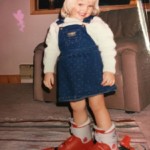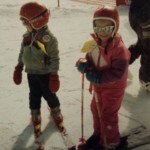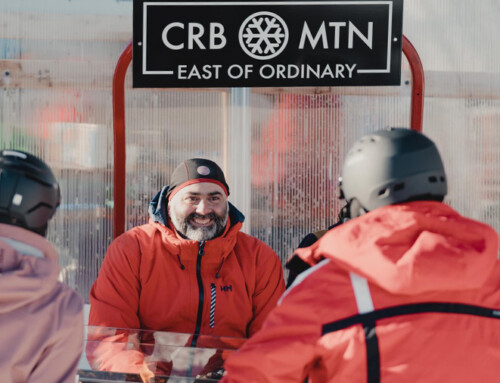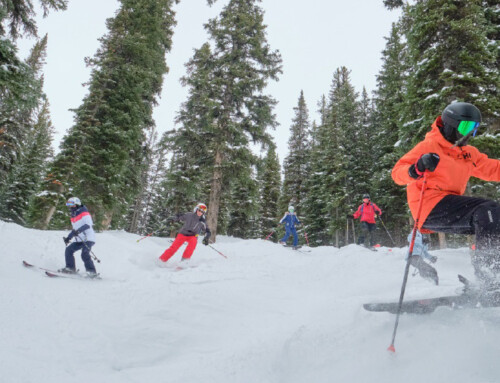What does it mean to live, work, and raise your family in a Canadian ski town? What are the joys? The sacrifices? The consequences of committing your work and family life to the sport of skiing? In this series, Lori Knowles interviews generations of families living “the dream”. This week she talks with Nancy Morden, Mayor of Whistler, and her daughter Sarah — part of a prominent family working, living, playing in Canada’s most notorious ski town.
IT WAS WHISTLER’S SUMMER OF LOVE. 1973. The age of streakers, ski bums, Trudeau and Nixon in office, Lighthouse and The Guess Who on 8-track, Kojak on TV. Two Ontario kids — Nancy Wilhelm and Ted Morden — ditched university to set up camp in a squatter’s cabin in Whistler, a hot bed of hot doggin’, summer glacier skiing, and “live and let live.” Who could guess this hippie adventure would lead to respected careers in law and real estate, raising a family on the slopes, and a run at the ski town’s top job: Mayor of Whistler?
This classic Whistler family story starts with Ted Morden’s flight from Kitchener to Whistler the moment he graduated from high school. His sweetheart, Nancy Whilhelm, followed for a two-week vacation, promising her parents she’d be back in time for university’s start in the Fall of ’73. But when the time came to return, says Nancy: “I called home and told my parents I wasn’t coming back. I was 18, there wasn’t a heck of a lot they could do.”
Ted and Nancy picked up odd jobs logging, pumping gas, bartending at The Boot back in the day when patrons would ride up to the bar, literally, on horseback to order a brew. It was the same year Chris Speedie snapped his iconic photo of hippies posing naked in front of Whistler’s Toad Hall. The town’s first robber had already towed Whistler’s entire bank away on a trailer. And, as luck would have it, Whistler Mountain had a record snow year in 1973/74. These two Ontario kids who’d never skied anything higher than the Niagara Escarpment embarked on the ski time of their lives.
Spool the film reel forward more than 40 years and you’ll find Ted and Nancy Morden, 61, still skiing and still living in Whistler. A lot has changed. They have two kids who love the sport. Ted is one of the community’s best known realtors; Nancy runs a law practice, plus … she’s the Mayor of Whistler. They owe it all to a love for skiing.
Anything But Boring
Squatting rent-free in a rustic cabin Ted built in the forest in 1975, the couple saved enough dough to put Nancy through law school in Vancouver. Through it all, Ted was steadfast about staying in Whistler. Once law school was done, Nancy gave up on her aspirations as a big city trial lawyer to rejoin her husband. Launching a law practice in Whistler Village, “I figured it was the end of an interesting law career,” Nancy says, “but truthfully, the experience has been anything but boring.”
One of her first cases: Digging deep into Whistler history, calling its pioneers as witnesses in court to determine if a local road was private or public. She famously represented Gilles Blackburn in a lawsuit after the Quebec skier and his wife were stranded in the BC backcountry for nine days near Kicking Horse; his wife perishing before being rescued. Wilhelm-Morden was on the law scene in 2008 when a tower collapsed on Whistler Blackcomb gondola, injuring 12 people. “Yes,” Nancy says, “I’ve seen the dirty side of skiing.”
If anything, the experiences have solidified a lifelong commitment to the sport. Nancy admits there are times when she’s nervous on a ski lift, “but I take deep breaths and give myself a stern talking to.” She and Ted raised their two daughters – Sarah and Jessie Rose – on Whistler’s slopes. Enrolling them in Ski Scamps, skiing double blacks, giving them skills to ski trees, bumps, and steeps, tackling the tough stuff with spunk, spark, and loads of free spirit. “We raised them to love and respect the mountains,” Nancy says. “There’s not a day that goes by we don’t appreciate this place.”
Trickle Down
It’s an appreciation that has trickled down to her children. Sarah and her sister live and work in Whistler. While they’ve traveled, attended school, dreamed of living in big cities or by the sea, something keeps them coming back. Sarah Morden describes a Whistler childhood filled with unlocked front doors, Olympians as neighbours, hours of pure freedom skiing powder-filled slopes. “Ski Scamps ran out of a big red tent at Olympic station,” she says. “The tent smelled like grilled cheese and stinky feet. It was equal parts awful and… well, kind of the best.”
Sarah’s earliest memories include clomping around her living room on skis at the age of two; skiing Whistler every winter Friday with the local elementary school; being lifted on stage as the town celebrated Ross Rebagliatti’s Olympic win in Nagano. She grew up alongside Olympic snowboarder Mercedes Nicoll. As a little kid she shared bathtime with Olympic gold medallist Ashleigh McIvor. “When people hear I’m from Whistler they ask if I ski. I want to respond: Well yeah… I also breathe.”
When asked about drawbacks of raising her family in a town much of Canada regards as a “dream place,” Nancy admits there are sacrifices. Art and culture — dance, theatre, galleries — though thriving now in Whistler, were scarce as the Warden kids were growing up. Affordable housing remains a challenge; earning a living wage can be tough.
Still, the Mordens say they wouldn’t approach family life any other way. “I grew up in this town,” Nancy says. “I was only a kid when I arrived, which is astounding when I think about it.”
Is Whistler’s mayor happy she called home at the age of 18 to tell her parents she wasn’t coming back? Indeed she is. “Whistler,” she says, “is an amazing place.”










